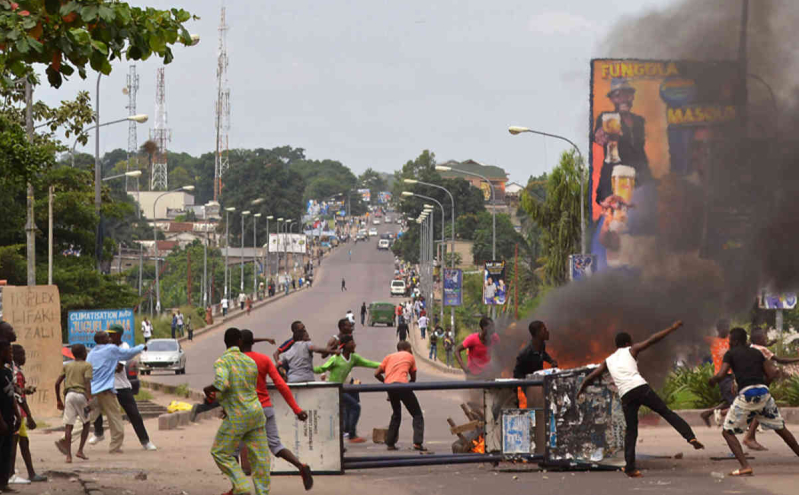
At least four people were killed on Tuesday when police in Congo Republic clashed with protesters who say plans for constitutional change are aimed at keeping President Denis Sassou Nguesso in power.
Sassou, who has ruled the oil producer for all but five years since 1979, follows other veteran African leaders in seeking to extend his rule beyond current constitutional limits. The opposition, however, is stepping up protests ahead of a referendum on Sunday on removing constitutional limits to him seeking a third successive term.
Police fired tear gas and warning shots to disperse thousands of protesters who gathered early in the morning in defiance of a recent government ban on public meetings, waving banners reading "Sassou get out" and "No to the referendum".
Marchers in Brazzaville scattered after the police opened fire but remained on the streets, burning tires and erecting barricades while helicopters circled overhead. Police stations were attacked in the south of the city, an opposition stronghold.
When demonstrators refused to disperse, protesters said security forces turned their guns directly on the crowd. A Reuters witness saw four bodies, marked with bullet holes, brought to the central morgue.
Sassou's plan echoes similar efforts by Burundi's President Pierre Nkurunziza, who overcame violent protests to extend his rule. Long-time presidents in Rwanda and Democratic Republic of Congo are also seeking means to extend their mandates.
"I was there when they opened fire," said one protester who brought his friend's body to the morgue, declining to give his name. "I was lucky it wasn't me who was killed. All this because of a president who doesn't want to go."
Although Sassou Nguesso is barred from seeking a third term due to age and term limits, the 71-year-old is expected to be a candidate at elections scheduled for next year. His proposed constitutional reform would remove these restrictions.
Mobile Internet and text messages were down in Brazzaville, residents said, and Radio France International (RFI) said its signal had been blocked. Government spokesman Thierry Moungalla said fragile Internet and phone services had been crashed by high demand from users.
"The radical opposition promised to march on the presidential palace today so it's logical security forces took steps to preserve the peace of our citizens, freedom of movement, and the stability of the state," he told RFI.
Shops, schools and government buildings were closed and a Reuters witness said shots could still be heard in the city during the afternoon.
"The police have been reinforced by the Republican Guard and (pro-Sassou) militias," Maurice Massengo-Tiasse, president of the Radio Television Forum for Human Rights, said by telephone from the southern Brazzaville neighborhood of Bacongo. "There are many wounded. They are shooting with live rounds."
For some, the violence brought back memories of the run-up to the 1997 civil war that swept Nguesso back to power.
"Since peace is being threatened, I'm moving my family out of caution," said teacher Igor Serge Zolani as he waited for a train at the Thomas Sankara station, adding that he lost family members in the civil war.
Four people were seriously wounded when a police officer fired on an opposition rally in the oil hub of Point-Noire on Saturday and remain in hospital.
"President Sassou Nguesso is organizing a coup d'etat, a constitutional coup d'etat," Paulin Makaya, leader of the opposition United for Congo party (UPC), said by phone. "We call on international nations, the United States and France, to heed what is happening here in Congo Brazzaville."
(Additional reporting by Aaron Ross in Kinshasa; Writing by Makini Brice; Editing by Daniel Flynn/Ruth Pitchford)






